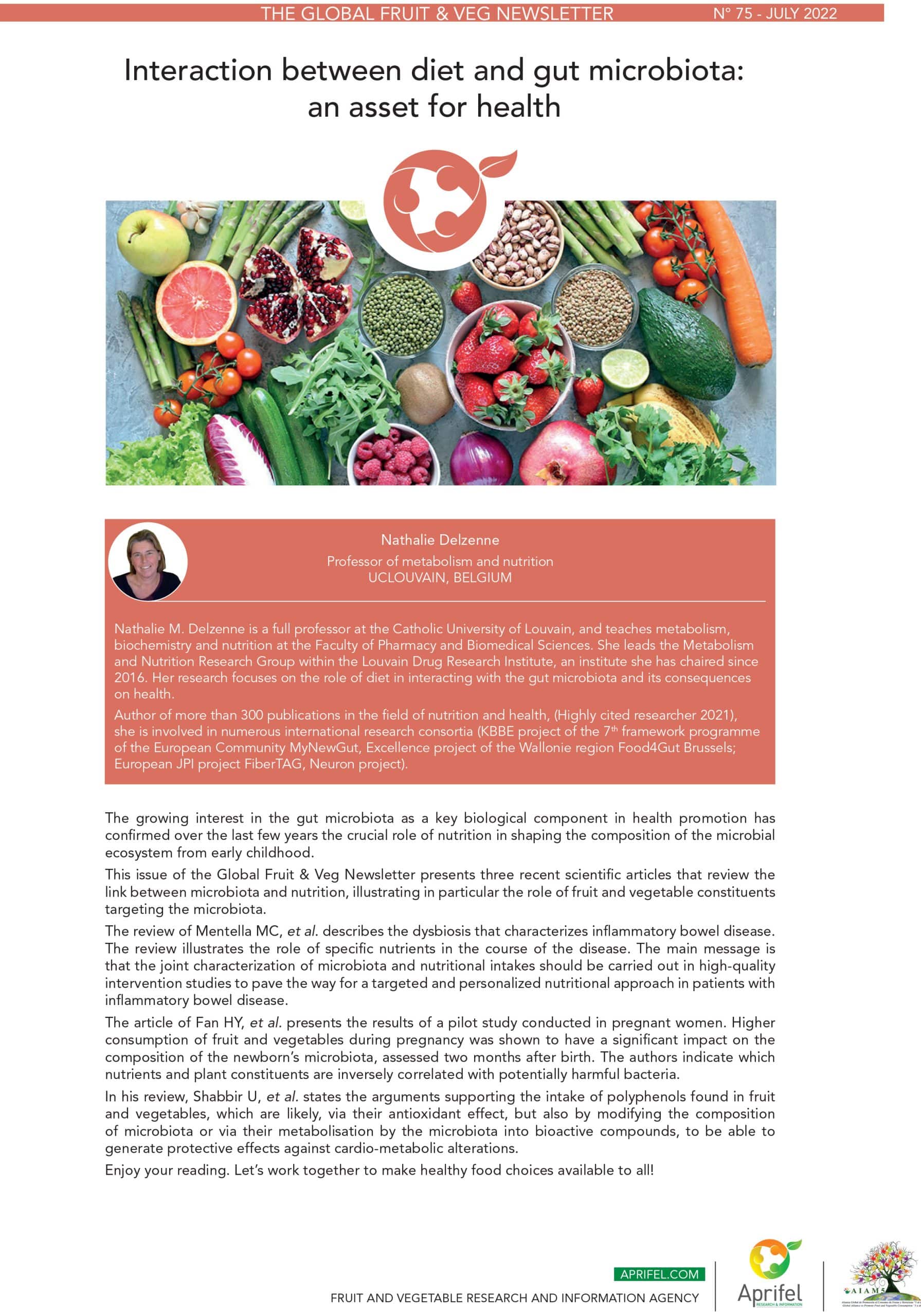The role of nutrition on Inflammatory bowel disease onset and management, and on gut microbiota composition

Inflammatory bowel disease (IBD), an heterogenous set of inflammatory diseases, is mediated by the immune system, which affect the gastrointestinal tract. Two main IBD manifestations are known: Crohn’s disease and ulcerative colitis. An estimation of 3 million people in the US population, representing 1.3% suffers from IBD, with an incidence and prevalence increasing worldwide (Veauthier, 2018; Dahlhamer, 2016). Nevertheless, the etiology of IBD is still not completely understood with several findings showing an interplay of genetic factors, immune dysregulation, and environmental triggers (Dixon, 2015; Leone, 2013). Environmental factors, beyond geographical location, are mainly diet, smoking, alcohol, and drugs (Molodecky, 2012).
This review aims to give further insights on the relationship between nutrition, microbiome, and inflammatory bowel diseases.
Microbiota composition changes in patients suffering from Inflammatory Bowel Disease
Diet, lifestyle, hygiene, or antibiotic consumption stimulate rapid and constant changes in gut microbiota composition which can therefore induce a rapid shift in the microbiome. When there is a genetic background predisposition and an intervention of environmental factors, those changes have a pivotal role in determining the onset of IBD as it is clearly associated with intestinal dysbiosis (Lane, 2018).
Studies characterizing the microbiota of patients suffering from IBD indicate a generalized decrease in biodiversity alpha, as well as a reduction in specific taxa including Firmicutes and Bacteroidetes, Lactobacillus and Eubacterium. They also present a reduction in species reducing butyrate wich modulate positively intestinal homoeostasis (Lane, 2018; Franck, 2007; Li, 2015; Christl, 1996).
The impact of specific nutrients on the onset of Inflammatory Bowel Disease
As diet and nutrients are highly associated with the incidence of IBD, the following table address the ilpact of fats, proteins, carbohydrates and fiber on the onset and the progression of the disease (Table 1).
| Nutrients | Impact on the onset of IBD | |
| Positive impact | Negative impact | |
| Fat | A balanced ratio of ω-3 to ω-6 PUFA is essential for homeostasis because ω-3 is anti-inflammatory whereas ω-6 PUFA is pro-inflammatory (Raphael, 2013). | Long-chain triglycerides are involved in increasing the risk of developing IBD (Miura, 1993). |
| Medium chains are anti-inflammatory (Dixon, 2015). | An increased risk of IBD is seen following a high fat diet due both to increased intestinal permeability and to the alteration of the intestinal microbiota (Pendyala, 2012). | |
| Proteins |
High protein intake from different sources (red meat, fish, eggs, milk, nuts) may be a factor increasing IBD incidence, but mechanisms remain largely unknown. Some metabolites coming from protein fermentation (e.g., ammonia, total sulfide) seems to be increased in ulcerative colitis patients when compared to healthy subjects (Gilbert, 2018). |
|
| Carbohydrates and dietary fiber | Low fiber intake has been associated with increased IBD incidence. Fibers are fermented within the colon where they promote bacterial diversity, preserve mucosal barriers, and prompt the production of short-chain fatty acids that, in turn, positively modulate intestinal homeostasis and reduce inflammation (Christl, 1996). | Observations on humans showed that fructose malabsorption and lactose intolerance are associated with IBD, while observations on anomals reported that high carbohydrates intake favors dysbiosis (Martinez-Medina, 2014; Barrett, 2009). |
The impact of specific diets on microbiota and on the evolution of inflammatory bowel disease
| Specific diets | Presentation of the diet | Effectiveness and impact on microbiota |
| Specific carbohydrate diet (SCD) |
Complex carbohydrates are excluded on the basis that when they reach the colon, being still undigested, they cause fermentation and overgrowth of bacteria and yeasts, switching the microbiome toward a pro-inflammatory profile, finally causing IBD. Simple (mono-) saccharides are, instead, included. | Robust data, mainly on adults, are lacking to demonstrate the effectiveness of the specific carbohydrate diet. Prospective investigations through case-control studies are needed to get an exhaustive understanding of how this diet may impact the microbiota (Weber, 2019). |
| Prohibited foods : milk, grains, soft cheeses, and non-honey sweeteners. Allowed foods: unprocessed meats, most fresh vegetables and fruits, all fats and oils, aged cheeses, and lactose-free yogurt. |
||
| Low FODMAP Diet | Similar to SCD, carbohydrates that are poorly absorbed may lead to large intestine dysbiosis, inflammation, fermentation, water secretion and lumen distension. The only difference from SCD is that monosaccharide intake is discouraged. | Little is known how this approach may impact the underlying inflammation even thought it is currently accepted to use it to treat IBD patients for their irritable bowel symptoms (Weber, 2019). |
| Prohibited foods: high-lactose diary, excess fructose vegetables/ fruits/ and food rich in fructans/galactans and polyols. Allowed foods: Low FODMAPs foods such as dairy free from lactose, low fructans and galactans from vegetable and low fructose. |
||
| Gluten-Free Diet | Allowed foods: gluten-free grains from corn and rice, fresh poultry or meat, fruits, vegetables, and dairy. | This diet has a clear role in managing celiac disease, involving elimination of gliadin, but also in subjects suffering from non-celiac gluten sensitivity. However, the benefits of this diet are less clear for IBD patients (Weber, 2019). |
Based on: Mentella MC, et al. Nutrition, IBD and Gut Microbiota: A Review. Nutrients. 2020;12(4):944.
- At present, no clear indications toward a specific diet are available.
- The assessment of dysbiosis prior to the recommendation of a specific diet should become a standard clinical approach to achieve a personalized therapy.
- Future perspectives should include investigating the correlation between nutrients and microbiome through appropriate, well-designed, and targeted clinical studies.

